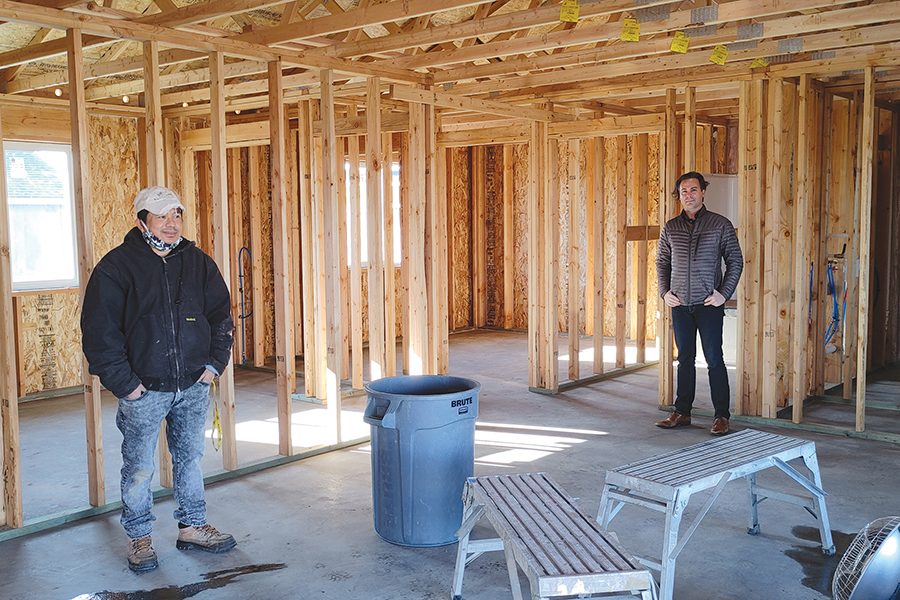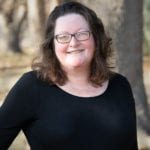
Home » Globe-trotting Richland native is back home, at helm of Habitat for Humanity
Globe-trotting Richland native is back home, at helm of Habitat for Humanity

December 15, 2020
Tri-County Partners Habitat for Humanity has a new executive director, a Richland native who came home after exploring the country and the world.
Jet Richardson signed on as the Richland-based nonprofit’s new leader just months before the pandemic struck. He spent the first year focusing on Habitat’s mission to build affordable homes with donations and volunteers.
One year in, he is ready to step into the spotlight to share the difficulties, the milestones and the story of Habitat, the feel-good juggernaut that puts hammers in hands of volunteers and homeownership in reach of the working poor.
The pandemic slowed – but did not halt – its progress. After a brief pause, staff and a core group of volunteers kept working at its latest development site on Cedar Avenue, east of Virgie Robinson Elementary School, between East Lewis and A streets.
Habitat completed the first two of 11 homes on Cedar in September and December, respectively. The latter is being built for Kyaw Htoo and Nay May Kayunar, refugees from Myanmar, formerly Burma, and their three young children.
Kyaw, pronounced “Jaw,” said he came to the U.S. after living in refugee camp for five years. The family rents an apartment in Kennewick and is looking forward to the stability that comes with owning a home. He devoted hundreds of hours to building Habitat homes, time he considers well invested because it gave him the skills to maintain his family’s new home.
Richardson hopes to complete eight of the 11 homes in the fast-growing residential neighborhood by the end of 2021.
Cedar Avenue is a showplace for a new way of building for Habitat. The city of Pasco made a small change to its building code that made a big difference in how the site is being developed. Instead of building five homes with extra deep lots, it is building 11 with manageable lots and shared driveways.
The new code lets builders create residential lots without public street frontage through shared driveways. That means deep lots like the ones on Cedar can be divided to support more homes.
Habitat is one of the first developers to take advantage of the change, which lowered land and development costs. That keeps costs down and homes affordable. Habitat homes typically sell for about $170,000 or the appraised value.
“That little code, insignificant to a lot of people, was remarkably impactful for us,” Richardson said.
The city said double-loading driveways will allow development of parcels that were previously difficult to build on.
The move will increase flexibility as it responds to the 50,000 newcomers expected in the coming decades, said Jacob Gonzalez, a senior planner in the city’s department of community and economic development.
The change has large implications for Habitat moving forward, Richardson said.
Keeping land costs down is a big part of keeping homes affordable. It is Habitat’s biggest challenge, in Pasco and elsewhere in the Tri-Cities.
Developing more homes on a site is a win for affordability and urban density.
“We can do the same house on a smaller lot,” he said.
Urban density is a professional passion for Richardson.
He graduated from Richland High School in 2001 and later from Seattle Pacific University.
He moved to Chicago, then joined the Peace Corps. An assignment to West Africa inspired an interest in urban planning.
“They had to move 2 million people around without consistent electricity,” he recalled.
When he returned, he headed to New York, where he pursued twin graduate degrees in urban planning and international relations at Columbia University. That led to four years working on foreign policy in Washington, D.C., in an agency focused on conflict resolution.
He spied the Habitat job posting when he decided to return to the West Coast and focus on urban planning. He got the job.
“I wasn’t expecting to come back to the Tri-Cities,” he said.
He calls his timing fortuitous. The Tri-Cities is at a turning point for urban planning, with a rising interest in denser and blended development. Habitat for Humanity wants to ensure that planning addresses affordable housing.
“Habitat is in a wonderful position to connect the dots,” he said. “Our families are hard working. They are well deserving.”
The Tri-County Habitat has built nearly 140 homes in the 26 years it has served the Tri-Cities and Walla Walla.
It builds homes for working families of all ethnicities who do not qualify for conventional home financing, generally those who earn 30%-50% of the area’s median income. That currently is $26,000-$46,500 for a family of four in the Tri-Cities.
Buyers pay a minimum down payment and contribute up to 500 hours of “sweat equity” by volunteering at construction sites. Buyers close on their homes with low-cost mortgages backed by Habitat and Yakima Federal Savings.
The combination of affordable land and donations of material and labor keeps mortgage payments down.
The local Habitat chapter has never foreclosed on a buyer.
“That is a testimony to the dedication of our homeowner partners,” Richardson said.
As a nonprofit, Habitat for Humanity depends on contributions and grants to support its mission. It sells homes to families that commit to join volunteers to build houses.
The pandemic forced it to adopt new rules to prevent the transmission of the virus that causes Covid-19 at construction sites, including limiting the number of people at a build to less than 10.
But Richardson said Habitat’s supporters have stayed with it, allowing it to continue its work. It received a forgivable Paycheck Protection Program loan, part of the federal CARES (Coronavirus Aid Relief and Economic Security) Act, as well.
Richardson said the biggest challenge is finding well-located home sites at a price that fits the Habitat model. It is eager to address housing shortages in the Tri-Cities and surrounding communities rather than concentrating in east Pasco.
“The remarkable thing is we’re still able to build,” he said.
Follow Habitat on Facebook @HabitatBuilds. Submit a homeownership application or make donations at habitatbuilds.com.
Local News
KEYWORDS december 2020




